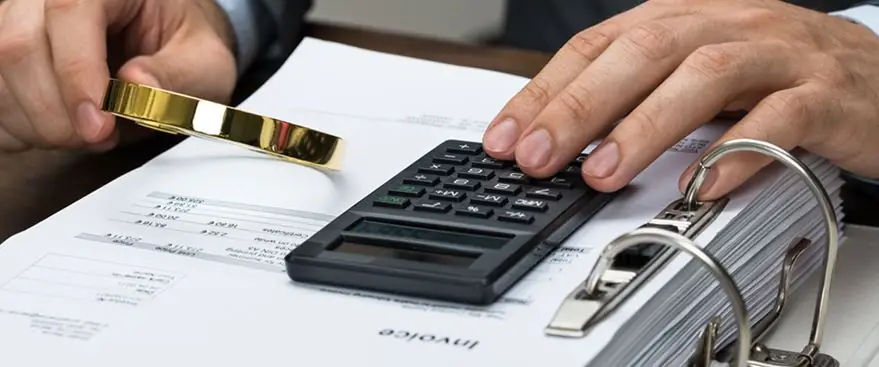2026 Author: Howard Calhoun | calhoun@techconfronts.com. Last modified: 2025-01-24 13:10:33
Control at the enterprise is partially carried out by internal audit. It is this segment of the company's management that shows how reliable and efficient the process of activity is. The internal auditor, a professional engaged in an impartial and professional assessment of the state of affairs of the company, exercises control. It should be noted that one of the mandatory requirements of the Central Bank of the country is the presence of such a department in all financial institutions.
Currently, internal audits are also carried out in companies not related to the financial sector. If there is such a department, the company's management is always aware of how things are going, the employee presents objective data, on the basis of which serious decisions can be made. In addition, if an internal auditor works in a company, employees perform their duties more efficiently, since this specialist has a psychological and educational influence on them, controlling their performance. It also makes it possible toprepare for an external audit.
General provisions
The employee who is accepted for this position is a specialist. To get this job, the applicant must receive a higher economic or vocational education. Employers also require special training and work experience in the accounting field for at least two years or as an auditor for at least one year.

Only the head of the company can hire or fire an employee. The internal auditor reports to the chief director of the company or his deputy. If an employee is absent due to a valid reason, his duties are assigned to his deputy or any other designated employee. At the same time, he assumes not only his functions, but also rights with responsibility as well.
Knowledge
An employee accepted for this position must know all the guidance and methodological materials that relate to the economic activities of the enterprise. He must also understand market methods of carrying out activities, understand the principles by which the economy develops, what are its features and patterns.
The internal auditor's certificate assumes that he knows all the standards, methods and procedures related to his direct activities. The employee must know the profile of his company, its specialization and structure. He must understand accounting, understand how accounting documents are compiled and what international standards are applied incompany.
Other knowledge
The employee holding this position must know by what methods the analytical activities of the economic and financial structure of the organization are carried out, how documentary audits and checks are carried out. The employee must have information about how money is circulated in the company, whether there are loans and according to what standards prices are formed on the market. In addition, the auditor knows how the organization is produced and business is conducted, how taxes are calculated.

The knowledge of an internal auditor should include financial, labor, tax and economic legislation, administration, marketing, ethics of business communication, organization of production, fundamentals of economics, management. An employee must be able to use communications, communications and computer technology, including a personal computer and specialized software.
Functions
The main function of the employee accepted for this position is the internal audit of auditors. He must control the management and financial statements of the company, analyze it, make sure that the information is reliable, compiled in a timely manner and at the right time got to the management. In addition, he is engaged in the unification and standardization of accounting processes in the enterprise, prepares a plan and budget for the audit in the company and provides it to higher management.
After the approval of the plan, he carries out all the checks and revisions included in it, according to the previously drawn upgraphics. Also, this employee controls the implementation of the budget, checks the safety of assets and monitors the efficiency of their use, controls the leakage of information and does not allow employees whose competence is below permitted to access financial information.
Responsibilities
It is also the responsibility of internal auditors to evaluate the expert type of contracts and projects. The employee holding this position controls the completeness of the reflection of accounting data in the reporting of transactions and contracts concluded, as well as in documents recording the results of the company and its contractors.
He is obliged to identify the company's internal reserves and determine how to use them more efficiently and profitably for the company. The employee monitors the spending of funds attached to programs and projects. It analyzes the profit and expenses of the company, optimizes and plans the payment of taxes.
Other functions
A Chartered Internal Auditor is required to carry out selective audits that will identify arrears and shortfalls. He controls how efficiently and in a timely manner the company and its counterparties fulfill their obligations. The employee analyzes accounts payable and receivables, suggests solutions to minimize them. Engaged in the development of a recommendatory plan aimed at eliminating the identified deviations in the work of the company.

During the implementation of new programs and projects in the company, the auditor determines possible external andinternal risks and analyzes them. Supervises personnel if their activities are related to the financial sector, analyzes job descriptions and checks the reliability and effectiveness of the distribution of duties between employees. He can delimit authority, suggest that the HR department make objective changes to the governing documentation.
Other duties
A qualified internal auditor is required to develop financial regulations for the financial policy of the company and for its individual segments, procedures and instructions. In addition, the employee participates in the formation of reporting documents related to consolidated and consolidated accounting, prepares the company for an external audit.

Also, an employee may be authorized to temporarily or permanently perform other duties that are not related to the audit, such as analyzing an investment project, maintaining the accounting department, reconciling data with suppliers and contractors. In addition, the internal auditor gives advice to the company's management regarding the scope of its activities. The employee maintains reporting documentation, provides reports and analytical data to superiors, draws up expert opinions, and the like.
Rights
The CIA's internal auditor has the right to access all departments of the company, as well as request all the necessary information for the audit. He has the right to give the employees of the company binding orders that concern them.activities, in particular, bringing documents of an internal type to a reporting form that complies with applicable standards and laws. He may oblige the staff to correct all errors and inaccuracies, as well as take measures to correct the identified deficiencies. If questions arise during the audit and revisions, the employee has the right to request explanations from the employees responsible for this.
Other Rights
He has the right to instruct employees to start preparing for an external audit, to offer management reasonable proposals aimed at changing the control system in the company. In addition, he may suggest changing the management policy in the company.

The internal auditor's job description assumes that he has the right to get acquainted with documents directly related to his activities, including instructions, a list of duties, criteria for assessing his work efficiency and others. He can also submit to the authorities for consideration proposals for measures that allow him to make the performance of his duties more perfect. In addition, the employee has the right to receive from the management the full provision of the technical and organizational conditions necessary for him to work.
Responsibility
The employee is responsible for the improper performance of his functions assigned to him by the company, in accordance with the current legislation of the country. He can be held accountable for administrative, labor and criminal offenses committed duringfulfillment of their duties. And also for causing material damage to the company under the current legislation of the country. He is responsible for disclosing confidential information and exceeding his authority, as well as for using them for personal purposes.
Training
Legal entities and individuals have the right to carry out audit activities if they have the appropriate license for this, the so-called internal auditor certificate. In order to get it, you must have a legal or economic education, as well as work experience in the field of audit. In addition, you will need to pass additional exams to obtain the required qualifications. There are currently four types of certificates. Most often, employers are interested in applicants who have received a certificate in general audit. But there are cases when specialists of a narrower circle are needed - these are banking, exchange, insurance and investment auditors. Internal auditors are trained in special centers.
Requirements for candidates
Employers really appreciate employees who have good communication skills, because they have to work with company personnel and resolve issues that cannot always be resolved without conflicts. It is very important that the applicant for the position is able to coherently express his thoughts both orally and in writing. After all, this is the only way he will be able to convey to the staff what exactly is required of him, and to the authorities to report on the current situation and convey important information.

Employeeshould be able to defend his point of view, because in the course of his work he will have to prove that another person is to blame for the problem he has identified, and he must fix it. An insecure auditor is unlikely to cope with his duties, because he will not be able to catch unscrupulous employees, his audits and checks will not really lead to anything, he will not be able to prove to the authorities about the appropriateness of certain actions to resolve the current situation.
He must be able to plan his day on his own, that is, have a high degree of self-organization, because as such no one exercises control over him. The employee must set tasks for himself and fulfill them. Employers usually give preference to applicants with an analytical mindset, without this criterion it is doubtful that an employee will be able to fully carry out their professional activities.
Employee Tasks
Like an external auditor, an internal auditor must conduct independent reviews of all processes in the firm in order to analyze and evaluate them. It ensures that the internal documentation and financial transactions carried out in the company comply with the current legislation of the country. In addition, he checks and ensures the accuracy of the financial and accounting statements of the company. His tasks include reducing waste on taxes, monitoring the availability and safety of company assets, helping managers and administration in managing human resources.
Conclusion
The result of an internal audit is not only preparation for an external one, but alsorecommendations: how to increase efficiency and rationalize the work of the company, organize follow-up control over the staff. When exactly it is necessary to conduct an audit, the CEO determines, based on the company's turnover, management structure, types of activities, the number of human resources and other factors.

If a company has at least four departments and several accountants, then the expediency of internal audit is undeniable. It will help reduce the costs of the company on external audit. If we are talking about large companies, then they hire not one employee, but a whole department headed by this professional. In his staff there may be a variety of specialized specialists, depending on the work that they have to perform. Thanks to such an employee, the productivity of all other employees increases, profits grow.
Recommended:
Closet keeper: job responsibilities, functions performed and working conditions

Job responsibilities of a cloakroom attendant - this is a list of all existing requirements in relation to this profession. They are based on the current legislation, the labor codes of the organization and on other regulations. In addition to duties, the employee also has his own rights, which the organization must take into account
Job responsibilities of a beauty salon manager: personal qualities and functions of an employee

The beauty industry is incredibly popular. Every girl and woman wants to look attractive, regardless of age. This applies to both young ladies and ladies of a more elegant age. Both those and others prefer to turn to the services of a professional in a beauty salon. The duties of the manager of such an institution, as a rule, involve the need to do everything so that customers are satisfied and come back again
Profession head of the train: description, job responsibilities and functions

The profession of the head of the train is very interesting and responsible, of course. There is one significant plus in it - it is more stable than ever. Even in the most critical periods of the life of the state, severe economic or political crises in the conditions of the closure or bankruptcy of many large industrial facilities, the railway will always function
Therapist: job description, required education, employment conditions, job responsibilities and features of the work performed

General provisions of the job description of a general practitioner. Requirements for education, basic and special training of a specialist. What guides him in his work? The main tasks in the work of a doctor, a list of job responsibilities. Rights and responsibilities of an employee
Marketing Specialist Job Description: Responsibilities and Required Skills, Sample Job Description

This employee is a specialist, so only the director can accept or dismiss him from his position. For this position, you must have a university degree in economics or engineering. Usually, employers do not require work experience. If an employee applies for the position of a marketing specialist of the second category, then, in addition to professional education, he also needs to work in the relevant position for at least three years

